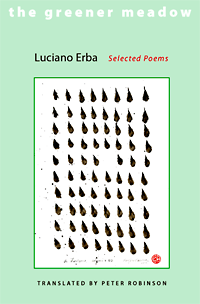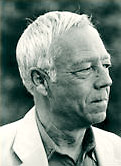
Luciano Erba
Twelve poems from Remi in barca [Shipping the Oars]
translated by Peter Robinson
Chicago
From the sad fountains of Quebec
from the great lakes, the prairie
you reach this intermediate space
halfway between stopover and nulle part
nor do you know if it’s evening or morning:
but by night the lighthouse beam
divides the dark like a paper-knife
by day from a skyscraper’s height
on the background you behold
as it might be through magnifying glass
another world.
Wrestle With the Void
To escape from the racket, piazza, the rallies
from the most irritating aspects of the void,
I turn to things without any significance
to presences with not a thing to say.
But I fall in a trap, catch myself unawares:
for the weaker the signals are
from no-places, stations, from outskirts,
the more the murmurs of silence reach me
yet again the void, yet again more drumming
from the non-existent.
To Her Smile
To my aunt
The doubt that the transit of the Spirit
in these spaces of brief duration
is only a projection of my spirit
without a capital letter
the suspicion that the beyond
is just a vain illusion
they vanished in a hospital room
at Campiglia Marittima where
your eyes smiled at me
when you saw me unexpectedly
prior to leaving us forever.
Telefonista por Favor
To Caterina
Who knows why
connected to another voice, a word
certain casual and unforeseen memories
are strong enough to nullify the I,
or subject whatever it be,
becoming an absolute of the not-I:
if this is the void
then it’s not that bad.
Spiritual Retreat
Worn out wayfarer
you come to a country of large table cloths
of faintly tasteless food
you leave every doubt in your dish
whiter you see the nuns
the beyond won’t be a great pressing of flesh
the leaves stirred by the wind
want to inform you of something already.
Transparencies of Mammon
But, to sum up, these pennies
do we really have to scorn them?
the parable of the talents
consider it a parable only?
From that misgiving we go down lower
to the diction of the vespers Corriere
regarding a political dirty-tricks man
it writes he’s ‘cleared customs’ from his party.
Even me a poor smudger of paper
I make use of trade expressions
as happens when searching through the dark
I take the deaths of others ‘on loan’.
The City’s Pigeons
Yes, them too, the city’s pigeons
so much less graceful than woodland birds,
pigeons that don’t cross over seas
(seagulls on the other hand, deluxe rag-pickers … )
them, the city’s pigeons
they fly between roofs and pavement
or in the pigeon-shoot fields
spread their wings between earth and sky
be it for the one time only
but there are more things
between heaven and earth …
them for example, the city’s pigeons
and other things you can’t understand
you aren’t even able to imagine.
Shapeless Clouds
Content yourself with these
isolate clouds in Rome’s sky
a sign disappearing
in the light of the sun
by the wind dispersed
all alone in the sky
it goes, stays, remains without shape
a painter is what we’d need.
Westminster
this epitaph
inscribed in Westminster Abbey
says perplexus vixi incertior moriar*
it could be mine, yet add uncertainty
about the same uncertainty to come
with postscript then
but hope is the final thing to die.
__________________________
*perplexed I lived, more uncertain I’ll die
Caterina
Caterina you say no
to cheese served with pears
Caterina you say yes
to rolls served with beer
Caterina different and near
we are racing on an arc of time
you’re only a little behind
a census variant … but
if you paint, the meadow’s greener
if improvise, your little theatre’s
puppets reply in rhyme
if you walk in the wood find the paths
if you look you intuit, if smile
it’s the spirit is near to itself.
The Midge
The midge that was flailing about in the glass
of eleven-degree red wine
saved through mere curiosity
studied at length on the tablecloth
flown away for one more of its tours
it will not go that far this evening:
between us two there’s a difference of span
yet I feel I’m as if reunited
with the studied insect
same as my verses: they chase after things
but encounter themselves in the end.
The Apple
The cut-in-half apple seems to have
two open eyes in place of its seeds
they smile, look at me, say to me
we’re playing, do as you please
if I then cut the apple in quarters
what remains of the seeds is half-closed
it has an angular, angry profile
it’s a look with no smile.
Note
‘The title of this collection, Remi in barca [Shipping the oars], published by Mondadori in autumn 2006, is not meant to suggest the conclusion to a voyage, something like “pulling down the sails”, but rather a moment of pausing that favours memories, reflections, and waiting’ — adapted from the author’s note.

Luciano Erba
Luciano Erba was born in Milan in 1922. He studied French, graduating from the Catholic University of Milan in 1947. His research has been in the literary history of the early sixteenth century, in nineteenth-century symbolism, and twentieth-century literature. Erba first taught in schools and then at various universities including Bari, Bologna, Udine, Verona, and the Catholic University of Milan. Though he has lived most of his life in the city of his birth, there have been extended periods spent abroad: in Switzerland during the latter part of World War II, where he was interned, from 1947 to 1950 in Paris, where he taught Italian, and from 1963 to 1966 in the United States, where he was first a visiting, then associate professor of comparative literature.
Erba made his literary debut with Linea K (1951). His numerous subsequent collections include Il male minore (1960), Il prato più verde (1977), Il nastro di Moebius (1980), L’ippopotamo (1989), L’ipotesi circense (1995), and Nella terra di mezzo (2000) — all collected in Poesie 1951-2001 (2002). He is known too for his translations of Blaise Cendrars, Pierre Reverdy, Henri Michaux, Francis Ponge, Thom Gunn, and other French and English poets. Erba has published a collection of stories, Françoise (1982), and, with Piero Chiara, edited an anthology of new postwar Italian poets, Quarta generazione (1954). He has been awarded many of Italy’s most prestigious literary prizes, including the Viareggio (1980), the Bagutta (1988), the Librex-Guggenheim ‘Eugenio Montale’ (1989), the Italian Pen Club (1995), and the Pasolini in 2005.
Princeton University Press published The Greener Meadow: Selected Poems of Luciano Erba, a bilingual edition with translations by Peter Robinson, in autumn 2006. Further details can be found here: http://www.pupress.princeton.edu/titles/8252.html.
Peter Robinson: There is a photo, a bio note and links to dozens of pieces of writing by Peter Robinson on his Jacket Author Notes page.
it is made available here without charge for personal use only, and it may not be
stored, displayed, published, reproduced, or used for any other purpose
This material is copyright © Luciano Erba and Peter Robinson and Jacket magazine 2006
The Internet address of this page is
http://jacketmagazine.com/29/erba.html
